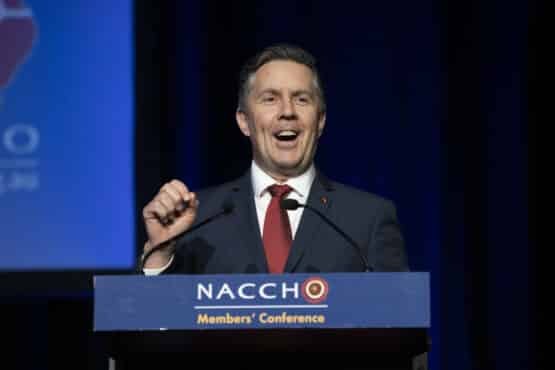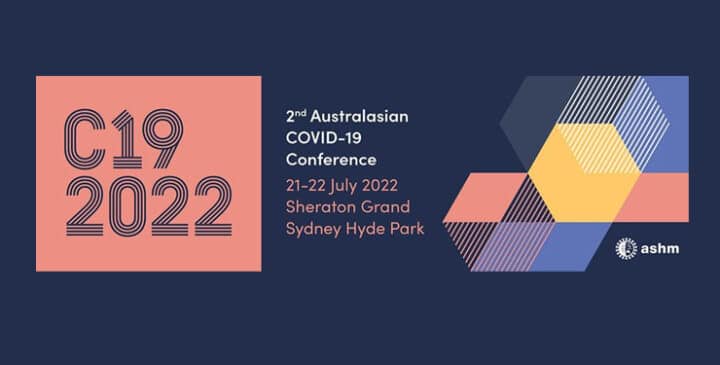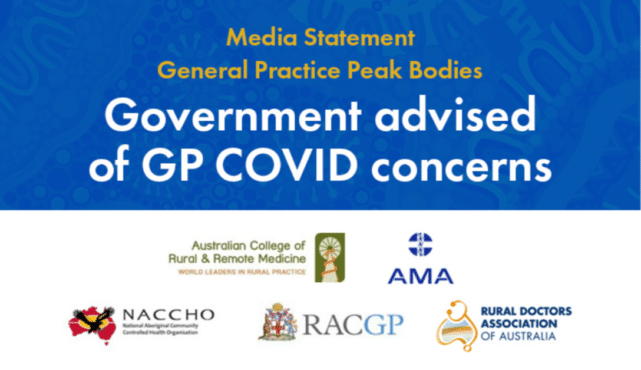

COVID-19 Aboriginal and Torres Strait Islander Advisory Group Communique, 29 May 2020
The Aboriginal and Torres Strait Islander Advisory Group on COVID-19 (the taskforce) was convened in March 2020, to develop and deliver a National Management Plan to protect communities and save lives; and to advise on health issues related to COVID-19.
The taskforce is co-chaired by the National Aboriginal Community Controlled Health Organisation (NACCHO) and the Australian Government Department of Health. This communique provides an update on the work of the taskforce and key areas of focus.
Progress against the National Management Plan
The taskforce has completed an analysis on the activities and investment under the Management Plan, reporting directly to the Australian Health Protection Principal Committee (AHPPC). The first report on implementation was delivered to the AHPPC on Friday, 8 May 2020.
The latest progress report, from 29 May 2020, highlighted the significant leadership, engagement and work from the Aboriginal and Torres Strait Islander Health sector and all governments in ensuring community and sector preparedness and management on COVID-19.
The update also noted key activities relating to the primary care measures and other activities such as the remote community travel restrictions and culturally appropriate communications to support Aboriginal and Torres Strait Islander people to stay safe from COVID-19.
National response
A wide range of measures have been implemented to protect Aboriginal and Torres Strait Islander communities from COVID-19 across Australia. This includes $206.7 million which has been allocated by the Australian Government to establish over 100 GP Respiratory Clinics across Australia, including in urban, rural and regional areas. As at 29 May 2020, there are 11 Aboriginal and Torres Strait Islander Community Controlled Health Services operating as Australian Government GP Respiratory Clinics across QLD, NT, NSW, VIC and the ACT. This is out of 122 operational sites more broadly across the country (i.e. roughly 10%). A further six will be operational in the coming weeks. Additionally, more than 348 fever clinics, jointly funded by the Australian and State and Territory Governments are in operation across Australia.
$6.9 million has also been provided to the NACCHO to support its Sector Support Organisations, member services and other Aboriginal and Torres Strait Islander health services to coordinate efforts around Australia’s COVID-19 response, and in particular facilitate culturally safe access to the GP Respiratory Clinics and COVID-19 testing.
Online Health Sector training and development
Supporting Aboriginal and Torres Strait Islander health and community controlled workforce continues to be a key focus for the taskforce.
The Australian National University, with input from NACCHO, developed online COVID-19 infection control training modules specific for remote health services, with an emphasis on Aboriginal and Torres Strait people and communities.
Two modules have been released so far, with a further three in development:
- An introduction to COVID-19 including understanding of the virus, epidemiology, transmission and patient diagnosis
- Contact tracing in remote communities, noting the significant challenges faced in remote settings should an outbreak occur.
Online COVID-19 training modules are available from https://covid-19training.gov.au/
Communications activities and community resources
The taskforce has been instrumental in leading a national approach to support tailored information for Aboriginal and Torres Strait Islander households, organisations and communities during COVID-19.
A range of national communications activities to support both awareness and preparedness have been developed under the tagline ‘Keep our Mob Safe.’ All communications have been grounded in a strength based approach to support a collaboration across the sector, governments and communities in delivering key messages and information that is culturally safe and community led.
Key topics of focus in public communications include:
- Understanding what COVID-19 is and how it spreads
- How to protect families, communities and elderly from the virus
- Encouraging access to support services, in particularly mental health, medical appointments for chronic illness management and domestic violence safety
- Protecting family and community from the impacts of flu/influenza.
A range of materials have been developed in partnership with a First Nations media communications agency including: video messages, brochures, posters and a regular eNewsletter. This has been done in conjunction with mass media advertising including print, radio, digital and social advertising which has been specifically developed to inclusive of Aboriginal and Torres Strait Islander audiences.
This has also included a partnership with First Nations Media Australia to provide regular and timely information to Aboriginal and Torres Strait Islander broadcasters and media sector encouraging local in-language translations and community adapted information.
A stakeholder toolkit has recently been published, with posters and brochures distributed to key community and health organisations nationally as we continue to encourage awareness and preparedness, and seeking medical advice for coronavirus-like symptoms, even while national restrictions are easing.
Information about the taskforce and communication resources are online at https://health.gov.au/covid19-indigenous
Supporting remote communities during COVID-19
Rapid Point of Care Testing
The taskforce has worked closely with the Australian Government to establish a rapid COVID-19 Point of Care Testing (PoCT) Program for remote and rural Aboriginal and Torres Strait Islander communities. The $3.3million program, once fully rolled out, will enable 83 testing sites across Aboriginal and Torres Strait Islander communities most at risk, and most in need.
The taskforce has advocated for enhanced support for remote and rural communities to access rapid testing facilities to quickly identify cases of COVID-19 to prevent spread, particularly in areas where infrastructure and/or ability to self-isolate is compromised due to lack of housing and crowding.
Since the start of the COVID-19 outbreak, some communities have reported testing times of up to 10 days in some remote areas, largely due to long transit times to samples to laboratories located in central areas.
The end goal is that every primary care service is no more than two to three hours’ drive away from a testing location, whether PoCT or conventional.
On 21 May the first two PoCT were conducted in Western Australia. Both test results were negative, saving the patients from a medical evacuation, and the additional stress on patients, families and communities.
Remote community preparedness and Medical evacuation
The Australian Government has allocated $5 million in grants for remote community organisations, such as ACCHS or local health clinics, to support planning and preparedness activities in remote communities. Specific activities are prioritised and determined by the community. Funding was targeted to 56 organisations covering 121 communities. The area covered by the funded services includes the majority of remote and very remote areas including the Northern Territory; Country WA; Country SA; Northern Queensland; Western Queensland; Central Queensland, Wide Bay and the Sunshine Coast; Western NSW; and Tasmania’s Flinders Island and Cape Barren Island.
The taskforce has been providing advice and guidance to the Australian Government to enable remote communities to access government funded medical evacuations quickly, if and when needed.
Work is progressing to ensure that patients can be evacuated to larger towns / health care facilities even when symptoms are mild, to be closer to healthcare facilities and avoid spreading coronavirus in communities; and rather than having to be really sick before evacuating. The ability to evacuate cases quickly is a key element of reducing the potential spread and impact of COVID-19 in remote communities.
$52.8 million in funding has been committed by the Australian Government to provide early retrieval and evacuation services of confirmed or suspect COVID-19 cases in remote communities. The funding will also enable deployment of mobile respiratory clinics and supplementary health services in rural and remote locations where existing health facilities cannot be repurposed.
Funding is also being provided to the States and Territories to support scale up activities for co-ordination and logistics, based on the size of their remote population covered and ability to scale up medical retrieval services in response to COVID-19. The Royal Flying Doctor Service and CareFlight NT will also scale up their existing services.
The taskforce has reiterated the importance of ensuring remote health care providers know that a medical evacuation can be requested, and that flight crews are reassured that the service is funded and supported, to enable timely responses.
Remote Framework – conditions for easing remote area travel restrictions
On 26 March 2020, the Minister for Health made a Determination under the Biosecurity Act 2015 to restrict travel into remote communities. This followed calls for travel restrictions, led from community and health leaders, to restrict movement into certain remote areas to protect Australians who are of a greater risk to COVID-19. The key focus of the Determination is lowering the risk of COVID-19 in all communities, including in Aboriginal and Torres Strait Islander communities.
These measures have been successful, with no cases of coronavirus among Aboriginal and Torres Strait Islander people in remote communities,
On 8 May the Australian Government announced a national three-step plan for easing restrictions and keeping people and communities COVID-19 safe. The three-step plan will look different in each state and territory, depending on the level of risk and case load in each jurisdiction.
This broader easing of restrictions and reduced risk profile nationally has led to some jurisdictions, communities and stakeholders requesting advice on when and how the remote area travel restrictions will be lifted. In response, the Advisory Group developed the Remote Framework outlining conditions to inform recommendations to lift the requirements under the Determination. Consultation with communities will be led from the relevant state or territory government.
The Remote Framework was announced by the Prime Minister on Friday 15 May after National Cabinet and is available on the Department of Health’s website.
Data collection and identification in healthcare and pathology testing
The taskforce is discussing the importance of improved data collection and has agreed the critical need for a national approach to include an Aboriginal and/or Torres Strait Islander identifier field on all pathology testing processes and other routine healthcare.
The more information that can be collected to accurately reflect the number of people for both testing and confirmed cases is critical in health planning during COVID-19 and for public health management more broadly, such as the 715 Health Check for Aboriginal and Torres Strait Islander people, vaccination and screening services. Collecting patient identification is essential to ensure adequate Medicare services are both available and claimed.

